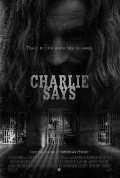
Directed by
Mary Harron
104 minutes
Rated MA
Reviewed by
Bernard Hemingway


Charlie Says
Knowing the subject matter of Mary Harron’s Charlie Says, the infamous 1969 Manson murders, may well incline viewers to look elsewhere but whilst it is not a film one can enjoy it is, precisely for the same reason, one that can be appreciated.
The foundation of the film’s success is Guinevere Turner’s measured and articulate script which gives Harron the ability to explore the events without getting carried away by their potential for genre sensationalism (as did, for instance, a film that, came out the same year The Haunting of Sharon Tate)
Focussing our attention on the three young women who carried out the murders on Manson’s instructions, Turner comes up with the device of a graduate student (Merritt Wever) who, on the sympathetic prison governor’s instruction, is working with them to try to disentangle their minds from Manson’s hold over them. This gives the film the opportunity to explore the girl’s motives and justifications without resorting to the contrivances of expositional dialogue. Indeed one of the most appealing aspects of the film is the way that the women gradually open up to Karlene’s gentle probing.
Throughout the film Harron cuts back and forth from these prison sessions to three years early and happier times when the girls first met at the Spahn Movie Ranch. Wide-eyed Leslie/Lulu (Hannah Murray) already swept away by the peace and love rhetoric of the day meets Sadie (Marianne Rendón) and Katie (Sosie Bacon) and becomes easy prey for Manson (English actor Matt Smith) and his cult-like “Family”. The film is a kind of colloquy between these before-and-after moments as Karlene tries for herself nearly as much as for the girls, to understand how they could have done what they did. Harron scrupulously avoids indulging any voyeuristic recreations of the actual Tate murders. What splatter we do get, and it is justifiable, is confined to the murders of Leno and Rosemary LaBianca the following night.
If Turner and Harron's humanizing approach counters any exploitational potential, the material had, the casting is judiciously unglamorous and the performances completely convincing. Never a false note creeps into proceedings with Smith making the appeal of Manson’s tawdry charisma to the naïve and none-too-smart hippie girls palpable.
Despite its gruesome subject matter Charlie Says is an intelligent, compassionate film. My only reservation is the film’s coda-like ending which seems gratuitous if not trivializing.
FYI: Quentin Tarantino’s Once Upon A Time In Hollywood which came out the following year also makes extensive use of the Spahn Ranch as a location and combined with the, admittedly more extensively, re-imagined ending makes for quite an uncanny double-bill.
Want something different?





